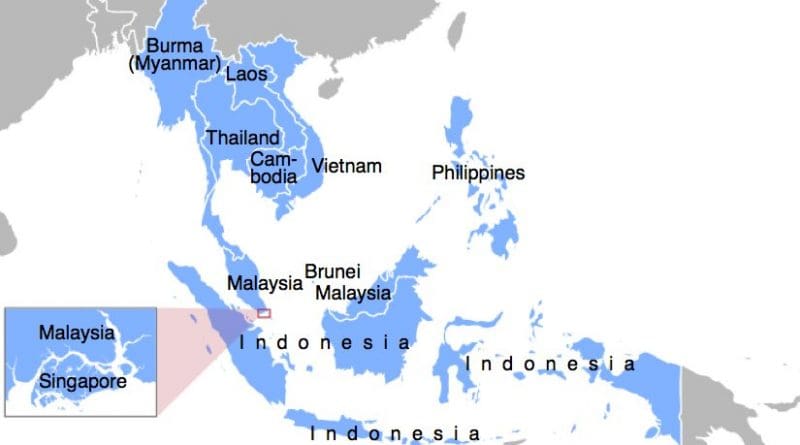ASEAN Minus X: Should This Formula Be Extended? – Analysis
By RSIS
ASEAN should enhance its ability to respond to challenges involving regional security. While preserving its practice of consensus, ASEAN should propose that the ‘ASEAN minus X’ formula, already agreed to and used on economic affairs, be extended to include specific security matters, notably, terrorism and preventive diplomacy.
By Ralf Emmers*
The practise of consensus has been at the core of the ASEAN decision-making process since its formation in 1967. While slow, it often produces good decisions supported by and resulting from intensive dialogue. During the process of consultation, consensus is built up between all the member states through the avoidance of officially stated disagreements.
Rather than suggesting unanimity, this practice of negotiation requires willingness by the members to compromise on their own national interests for the sake of the larger region. This approach to decision-making has long been seen as the only option to consolidate the national interests and domestic legitimacy of the member states while at the same promoting regional interests. The consensus decision-making model is still necessary to address the differences that exist across ASEAN.
Something Wrong With Consensus?
The consensus decision-making process has come at a cost. It has led to the adoption of collective decisions based on the lowest common denominator. Individual members have at times constrained attempts at enhancing regional cooperation due to a narrow understanding of their own national interests.
This was illustrated, for example, by ASEAN’s failure to issue a joint communiqué, a first in the organisation’s history, at the end of the ASEAN Foreign Ministers’ Meeting (AMM) in July 2012 in Phnom Penh. The Philippines had insisted on a reference to an incident between Manila and Beijing at Scarborough Shoal earlier in 2012 but Cambodia, acting as the ASEAN chair, refused on the grounds that the territorial dispute with China in the South China Sea is bilateral.
A close economic partner of China, Cambodia sought to appease Beijing by minimising the internationalisation of the South China Sea issue at the expense of ASEAN unity.
In light of deepening economic and diplomatic ties with China, there is concern that other members may endorse Beijing’s preferences and stop ASEAN from taking decisions. Moreover, the consensus decision-making process has been undermined by a divergence in strategic outlooks in ASEAN and a series of financial, political and humanitarian crises.
The process of consultation and the achievement of consensus have therefore become painstakingly slow in light of rising intra- and extra-mural challenges.
Should ASEAN-X Be Extended?
Analysts have called on ASEAN to change, or at the very least adjust, its decision-making process. A shift has already happened through the adoption of the ASEAN minus X (A-X) formula. The latter currently governs economic issues by enabling two or more ASEAN states to move ahead in economic liberation on the basis that the other members will follow at a later stage.
A-X has been applied on an ad hoc basis to other areas of cooperation. For example, the ASEAN Convention on Counter-Terrorism came into force before its full ratification by all the 10 members in 2013. Can A-X govern security on top of economic affairs? Can it be done without undermining ASEAN’s cohesion?
Changes to the decision-making process must be carefully thought through. All members have national interests on which they cannot make concessions. National priorities include the core principles of national sovereignty and territorial integrity but also a series of other issues that are more specific to the individual members. Any attempt at curtailing such principles through A-X would disunite the member states and split them into opposing groups.
Which Security Areas?
ASEAN can widen A-X to specific security areas while preserving the overall practice of consensus. Rather than traditional security concerns, the extension of A-X should at first focus on niche areas to enhance ASEAN’s response to particular security challenges.
The way the ASEAN Convention on Counter-Terrorism entered into force suggests that counter-terrorism is an area where some members are keen to move faster than others. This was illustrated by the Marawi siege on the Philippine island of Mindanao when some ASEAN members offered to assist the Philippine security forces.
Besides counter-terrorism, A-X can be applied to preventive diplomacy. The latter refers to actions undertaken by sovereign nations to prevent inter-states disputes from escalating into armed conflict. Such an extension will demand flexibility. The High Council, ASEAN’s mechanism of mediation and consultation, requires the consent of all the parties to a dispute and this clause has undermined its implementation.
A-X can empower the ASEAN chair to conduct preventive diplomacy through confidence-building, shuttle diplomacy and fact-finding with or without the endorsement of all the members. This happened in the midst of the Preah Vihear dispute but outside the auspices of ASEAN. Then Indonesian Foreign Minister, Marty Natalegawa, conducted shuttle diplomacy between Cambodia and Thailand to de-escalate the border conflict.
Chances of Success
Important questions remain. How does one amend the ASEAN Charter to extend A-X to include security? Can an extended A-X be invoked by an absolute majority (ASEAN-6) or would unanimity be required? Finally, how do we go from establishing a new rule to using it when facing a crisis?
The consensus decision making process remains a mechanism to address the differences that exist in Southeast Asia. Yet it needs to be adjusted to cope with certain security challenges. Extending A-X to counter-terrorism and preventive diplomacy would be a step in the right direction.
*Ralf Emmers is Professor of International Relations and Associate Dean at the S. Rajaratnam School of International Studies (RSIS), Nanyang Technological University (NTU), Singapore. He concurrently heads the Centre for Multilateralism Studies (CMS) at RSIS.

